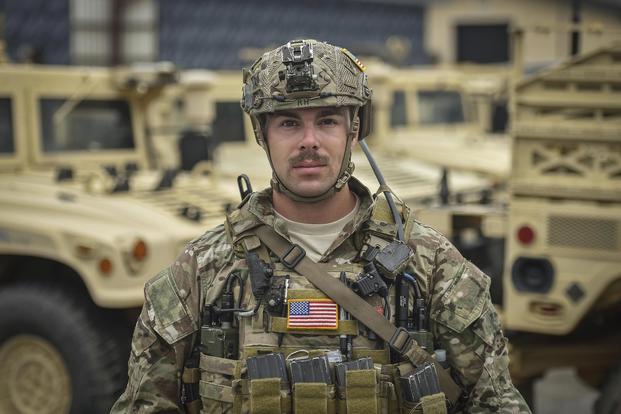Air Force Staff Sgt. Richard Hunter was accompanying a 50-man joint Special Forces team as they moved forward in Taliban-ridden Kunduz Province on Nov. 2, 2016.
As they snaked through an alleyway during the night mission in search of a high-value target in Boz Qandahari village, the U.S.-Afghan team came upon a barrier, "a large metal fence, that blocked the way, and it wasn't supposed to be there," according to Air Force Secretary Heather Wilson.
That's when the first enemy grenade was launched, and bullets started to spray during the ambush, said Wilson, who presented the Air Force Cross -- second only to the Medal of Honor for valor in combat -- to Hunter, a combat controller, on Tuesday for his steadfast decisions and courage during the U.S. Army-led mission in Afghanistan.
Related content:
- Airman Who Staved Off Ambush in Afghanistan to Receive Air Force Cross
- 2 Air Force Crosses Awarded for Heroism in Afghanistan
- Meet the Airmen Who Will Get Upgraded Valor Medals
Wilson said Hunter, assigned to 23rd Expeditionary Special Tactics Squadron, kept his position, never faltering as he called in "danger-close" airstrikes from AC-130 Spooky gunships and AH-64 Apache helicopters within 20 meters of their position.
Danger-close refers to strikes coming within 100 meters of friendly personnel. The firefight lasted for eight hours.
"What was truly extraordinary as I reviewed this story was the amazing precision and professionalism of the team," she said, speaking before the 23rd Special Tactics Squadron; Air Force Special Operations Command commander Lt. Gen. Brad Webb; and the AFSOC community at Hurlburt Field, Florida.
Hunter managed to position himself between the insurgents and his team, "shielding the wounded with his body, while providing suppressive fire with his rifle," according to the citation.
After clearing the compound, and taking cover with a few team members, Hunter exposed himself to gunfire again as he heard calls for help in the distance, "dragging a wounded teammate 30 meters to safety," the citation states.
For the next four hours, the airstrikes kept coming from the AC-130 "Spooky 43" gunship crew and the helicopters, including multiple 105mm rounds within as little as 13 meters from his location.
"Doesn't an insurgent fear, more than the sound of a jet fighter, the sound of an AC-130 gunship?" Wilson said.
In all, 1,787 munitions rained down on the enemy's position, which included 31 "danger-close" engagements, the citation said. More than 50 lives were saved, and 27 Taliban fighters were killed.
"Every [Joint Terminal Attack Controller], aircraft commander and ground force commander knows the risk of a danger-close mission," Wilson said.
"But 31 without a single fratricide [by friendly fire] on the ground is just astounding," she said.
"Thanks to [Staff] Sgt. Hunter, and his efforts to always be closest to the enemy, to put himself in the rear when everyone else got out of the way. To make sure his team was safe. He risked his own life and put himself in position to maintain tally on the target," Wilson said.
The secretary honored two Army Green Berets killed in action that day: Sgt. 1st Class Ryan Gloyer and Maj. Andrew Byers. Byers was posthumously awarded the Silver Star in February.
"Special operations is a force that we call when we really need the absolute best," Wilson said.
She added, "There's no better friend -- and no worse enemy -- than the United States special operations forces."
-- Oriana Pawlyk can be reached at oriana.pawlyk@military.com. Follow her on Twitter at @Oriana0214.




























